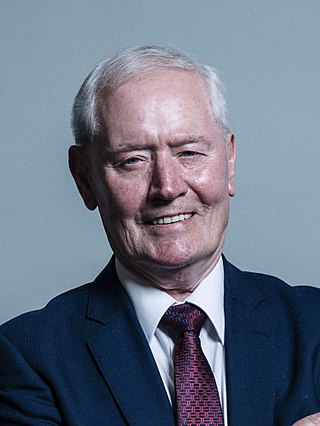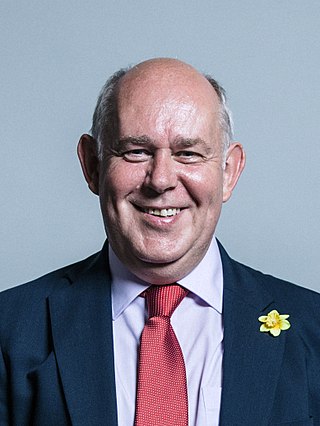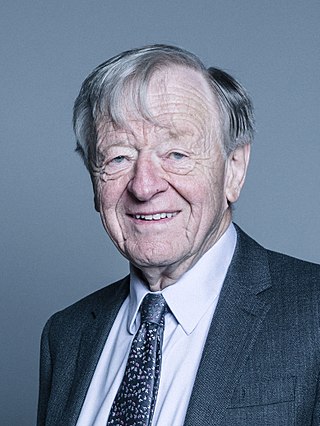
The Parliament of the United Kingdom of Great Britain and Northern Ireland is the supreme legislative body of the United Kingdom, and may also legislate for the Crown Dependencies and the British Overseas Territories. It meets at the Palace of Westminster in London. Parliament possesses legislative supremacy and thereby holds ultimate power over all other political bodies in the United Kingdom and the Overseas Territories. While Parliament is bicameral, it has three parts: the sovereign, the House of Lords, and the House of Commons. The three parts acting together to legislate may be described as the King-in-Parliament. The Crown normally acts on the advice of the prime minister, and the powers of the House of Lords are limited to only delaying legislation.

The Palace of Westminster is the meeting place of the Parliament of the United Kingdom and is located in London, England. It is commonly called the Houses of Parliament after the House of Commons and the House of Lords, the two legislative chambers which occupy the building. The palace is one of the centres of political life in the United Kingdom; "Westminster" has become a metonym for the UK Parliament and the British Government, and the Westminster system of government commemorates the name of the palace. The Elizabeth Tower of the palace, nicknamed Big Ben, is a landmark of London and the United Kingdom in general. The palace has been a Grade I listed building since 1970 and part of a UNESCO World Heritage Site since 1987.

Hansard is the transcripts of parliamentary debates in Britain and many Commonwealth countries. It is named after Thomas Curson Hansard (1776–1833), a London printer and publisher, who was the first official printer to the Parliament at Westminster.

The Government of Ireland Act 1920 was an act of the Parliament of the United Kingdom. The Act's long title was "An Act to provide for the better government of Ireland"; it is also known as the Fourth Home Rule Bill or (inaccurately) as the Fourth Home Rule Act and informally known as the Partition Act. The Act was intended to partition Ireland into two self-governing polities: the six north-eastern counties were to form "Northern Ireland", while the larger part of the country was to form "Southern Ireland". Both territories were to remain part of the United Kingdom of Great Britain and Ireland and provision was made for their future reunification through a Council of Ireland. The Act was passed by the British Parliament in November 1920, received royal assent in December and came into force on 3 May 1921.

Betty Boothroyd, Baroness Boothroyd, was a British politician who served as a member of Parliament (MP) for West Bromwich and West Bromwich West from 1973 to 2000. A member of the Labour Party, she served as Speaker of the House of Commons from 1992 to 2000. She was previously a Deputy Speaker from 1987 to 1992. She was the first and to date only woman to serve as Speaker. Boothroyd later sat in the House of Lords as, in accordance with tradition, a crossbench peer.

Dennis Edward Skinner is a British former politician who served as Member of Parliament (MP) for Bolsover for 49 years, from 1970 to 2019. A member of the Labour Party, he is known for his left-wing views and republican sentiments. Before entering Parliament, he worked for more than 20 years as a coal miner.

Alan Gordon Barraclough Haselhurst, Baron Haselhurst,, is a British Conservative Party politician who served as Member of Parliament (MP) for Saffron Walden from 1977 to 2017, having previously represented Middleton and Prestwich from 1970 to February 1974. Haselhurst was Chairman of Ways and Means from 14 May 1997 to 8 June 2010, and later Chairman of the Commonwealth Parliamentary Association between 2011 and 2014. The oldest Conservative MP to stand down at the 2017 general election, he was created a life peer on 22 June 2018, sitting in the House of Lords as Baron Haselhurst.

James Dolan Cunningham is a Labour Party politician in the United Kingdom. He served as the Member of Parliament (MP) for Coventry South from 1992 to 2019.

Albert Owen is a Welsh Labour Party politician who served as Member of Parliament (MP) for Ynys Môn from 2001 to 2019. He took the seat in the 2001 election from Plaid Cymru with a margin of exactly eight hundred votes and retained the seat at the four subsequent general elections. During his time in Parliament, he was a member of the Business, Energy and Industrial Strategy Select Committee, Welsh Affairs Select Committee and the International Development Committee. He was also a member of the Speaker's Panel of Chairs and vice-chair of the all-party parliamentary group on cancer.

Nicholas Douglas Palmer is a British politician, translator and computer scientist. He was the Labour Party Member of Parliament (MP) for Broxtowe in Nottinghamshire from 1997 until he lost the seat at the 2010 general election to Conservative Anna Soubry, by 390 votes.

Laurence Anthony Robertson is a British politician who served as the Member of Parliament (MP) for Tewkesbury from 1997 to 2024. A member of the Conservative Party, he chaired the Northern Ireland Affairs Committee for seven years, from 2010 to 2017.
Angela Lavinia Bray, Baroness Bray of Coln is a British Conservative Party politician who was the Member of the London Assembly for West Central from 2000 to 2008, and Member of Parliament (MP) for Ealing Central and Acton from 2010 to 2015.

Alfred Dubs, Baron Dubs is a British Labour politician and former Member of Parliament.

The Redistribution of Seats Act 1885 was an Act of the Parliament of the United Kingdom. It was a piece of electoral reform legislation that redistributed the seats in the House of Commons, introducing the concept of equally populated constituencies, a concept in the broader global context termed equal apportionment, in an attempt to equalise representation across the UK. It mandated the abolition of constituencies below a certain population threshold. It was associated with, but not part of, the Representation of the People Act 1884.

The Abortion Act 1967 is an act of the Parliament of the United Kingdom that legalised abortion in Great Britain on certain grounds by registered practitioners, and regulated the tax-paid provision of such medical practices through the National Health Service (NHS).
Parliamentary informatics is the application of information technology to the documentation of legislative activity. The principal areas of concern are the provision, in a form conveniently readable to humans or machines, of information and statistics about:
mySociety is a UK-based registered charity, previously named UK Citizens Online Democracy. It began as a UK-focused organisation with the aim of making online democracy tools for UK citizens. However, those tools were open source, so that the code could be redeployed in other countries.
The Public Whip is a parliamentary informatics project that analyses and publishes the voting history of MPs in the Parliament of the United Kingdom.
Naming is a procedure in some Westminster model parliaments that provides for the speaker to temporarily remove a member of parliament who is breaking the rules of conduct of the legislature. Historically, "naming" refers to the speaker's invocation of the process by calling out the actual name of the member, deliberately breaking the convention of calling on members by the name of their constituency.
In the Parliament of the United Kingdom, Members of Parliament (MPs) can be suspended from sitting in the House of Commons by the Speaker for "disorderly conduct". The Speaker can order an MP removed from the house until the end of the day. The speaker more often "names" an MP.














